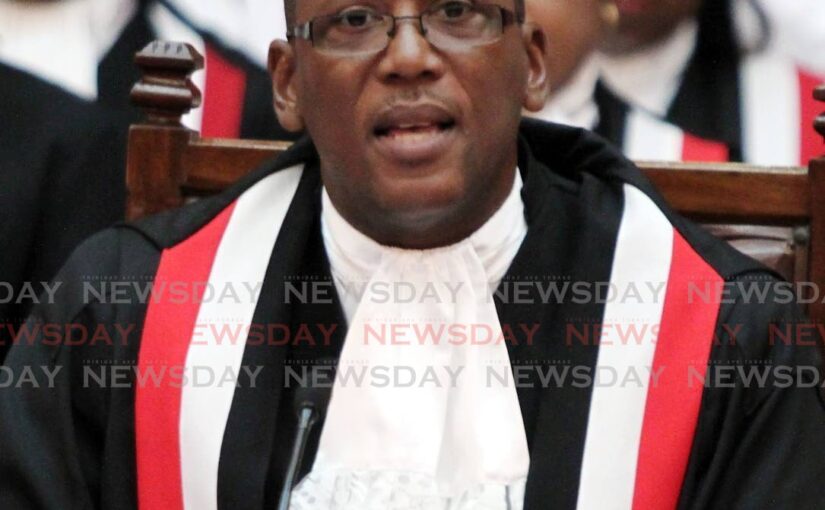Chief Justice Ivor Archie –
HEAD of the Criminal Bar Association Israel Khan, SC, believes there is “more in the mortar than the pestle,” behind Chief Justice Ivor Archie’s chastisement of Director of Public Prosecutions (DPP) Roger Gaspard, SC, in relation to the latter’s complaints about staff shortages and other issues affecting the operations of his office.
The controversy surrounding staff shortages at the DPP’s office escalated on Friday with Archie accusing Gaspard of negligence in the discharge of aspects of his function.
In a brief response to Archie’s statement on Saturday, Khan questioned the CJ’s sudden decision to speak out against Gaspard’s performance as DPP.
“I am wondering why it was necessary for the honourable Chief Justice to jump into this matter. Who is he defending?” he asked.
“No one accused the Chief Justice or the Judicial and Legal Services Commission of not filling the vacancies. So he has worsened the situation.
“I think there is more in the mortar than the pestle in the Chief Justice coming out to say what he is saying.”
Khan argued the CJ does not have a budget to hire lawyers in the DPP’s office “So I am wondering why he is saying the DPP did not make recommendations to fill the vacancies after three of the top senior officers were promoted to judgeship.
“We do not know if the other people automatically are qualified to be deputy director of public prosecutions.”
He said some of the issues Archie raised in the statement do not make sense.
“But the sum total of it is that it was not necessary to jump into this matter and worsen the situation.”
He said the Criminal Bar Association will issue a response to Archie’s statement tomorrow.
Meanwhile, former law association president Martin Daly, SC, opted not to comment decisively on Archie’s statement but raised several questions in relation to the operations of the DPP’s office.
“All I can say at this stage is that we need to have the allegations of fact being so stridently made by some of the highest office holders in the land. For example, ‘What is the reason the Park Street building is allegedly being shunned by the DPP? And did the Government enter into that expensive lease without investigating whether the building was fit for purpose?” he said via WhatsApp on Saturday.
Daly also wanted to know if the alleged filing of a small number of indictments was related to lack of staff and whether the DPP been tardy in putting forward candidates for appointment to his department.
“Are appointments and the DPP’s ability to put forward candidates for appointment being hindered by an unreasonable insistence that new hires will only be on contracts which do not provide all the benefits of permanent employment?
Newsday contacted several other attorneys seeking their comment on the issue but they declined.
In a six-page statement posted on the Judiciary’s Facebook page and website, the CJ broke his silence on the simmering issue, saying he felt compelled to address what he called the misconceptions that are being peddled in the public domain about the role of the DPP’s office in relation to the criminal justice system.
The statement came three days after Gaspard’s meeting with Attorney General Reginald Armour, SC, to discuss issues surrounding the operations of the DPP’s office.
Armour had issued a statement last Saturday, saying that the DPP’s was underperforming.
The Criminal Bar Association has since taken Armour to task over the issue and called on him to apologise to the DPP. Prosecutors have also called on him to apologise.
It argued the criminal justice trial system could be severely impacted if Gaspard’s concerns were not addressed.
Gaspard had complained that his office was hamstrung by “an acute and chronic”” staff shortages, which he said, affected its ability to prosecute cases in courts throughout TT.
He said in a radio interview on March 8 that his office has 58 attorneys, including some with little or no court experience. Gaspard added a Cabinet note of 2013 had proposed that the DPP’s office should have at least 137 attorneys. He said then he did not have the authority to hire contract officers as that was a matter for the Chief Personnel Officer.
He claimed the criminal justice system could collapse if vacancies at the DPP’s office were not filled.
The Prime Minister, responding to Gaspard’s statement at a political meeting on March 9, said, “None of us in this country have all that we need. But you got to make the most with what you have.”
Dr Rowley also criticised Gaspard for his failure to move into a building rented by the government since 2020 to relocate the DPP’s office to East Port of Spain.
Prosecutors said the building has remained unoccupied because of security issues identified by the police Special Branch and rejected a directive of the Attorney General to relocate immediately.
In his statement on Friday, Archie, among other things, accused Gaspard of failing to suggest names and do performance appraisals for prosecutors to be promoted and of failing to indicate the need to fill vacancies in his department.
He said legal staff at the DPP’s office comprises lawyers who are public servants (State Counsel, Assistant DPP, Deputy DPP, DPP) and lawyers employed on contract (Legal Officers 1, 2, senior legal officers.)
Archie, who is the administrative head of the Judiciary and chairman of the Judicial and Legal Services Commission (JLSC), added while the commission is constitutionally responsible for the recruitment of the public servants, it is not responsible for the recruitment of legal officers.
See also
“To recruit public servants (State Counsel, Assistant DPP, Deputy DPP, the JLSC must have a request from the DPP,” he said.
Archie also said the JLSC is responsible for the promotion of state counsel “and to do so it must have recommendations of the DPP and staff reports/performance appraisals on the officers done by the DPP.”
“The DPP must show that either no officer is being overlooked for promotion or if one is being overlooked that it is with good cause grounded in the bypassed officer’s underperformance as seen by the performance appraisal while ensuring that good performance management has been done by the DPP and the seniors.”
The CJ stressed the legal officers are under the control of the DPP.
“The DPP is by law (section 12 of the Judicial and Legal Service Act), a permanent secretary in accordance with section 85 of the Constitution.”
Archie said the standard procedure for filling of vacancies that arise in the Judicial and Legal Service is governed by Sections 13-15 of the Public Service Commission Regulations.
“In summary, as soon as it is known that a vacancy will occur, the Head of the Department (in this case the DPP) should communicate to the Director of Personnel Administration, who supports and is the point of contact for the commission, his recommendations for the filling of the vacancy.
“The JLSC relies on this information to determine whether it is in the best interest of the Judicial and Legal Service to fill the position from within and whether to advertise the vacancy externally as well as internally.”
Archie said the DPP’s input was crucial as he is responsible for the management, professional development and succession planning in his department.
In the statement, he also claimed the DPP’s perceived inaction has also resulted in his failure to file indictments in a timely manner.
He said in the five years that the Children’s Court has been in operation, not a single indictment has been filed by the DPP in that court.
Archie also dismissed Gaspard’s view that at least 150 attorneys were required to supervise the criminal courts.
He said the suggestion simply was not viable.
“I cannot say that I am at all convinced and so I must express concern at the insistence by the DPP on the level of staffing before agreeing to move forward to accept any change that may give relief to the criminal justice system,” he said.
But while Archie criticised the management skills of the DPP, he conceded, “Everyone recognises that the management of a department such as the Office of the DPP is an onerous task and with the level of crime it can be daunting and require caution. One understands the desire to see and do everything personally, but it can lead to bottlenecks which slow everything to a crawl.
The criminal justice system has serious procedural flaws which cause delay. Each agency has to address various elements of these flaws in order to have the system improve. No agency in the system can fix it on its own. Most agencies have been trying to address various elements and processes. The Judiciary has been seeking to make improvements in its processes, some of which are unfortunately thwarted by the failure or inability of other agencies to put in place matching procedures.”





















Discussion about this post